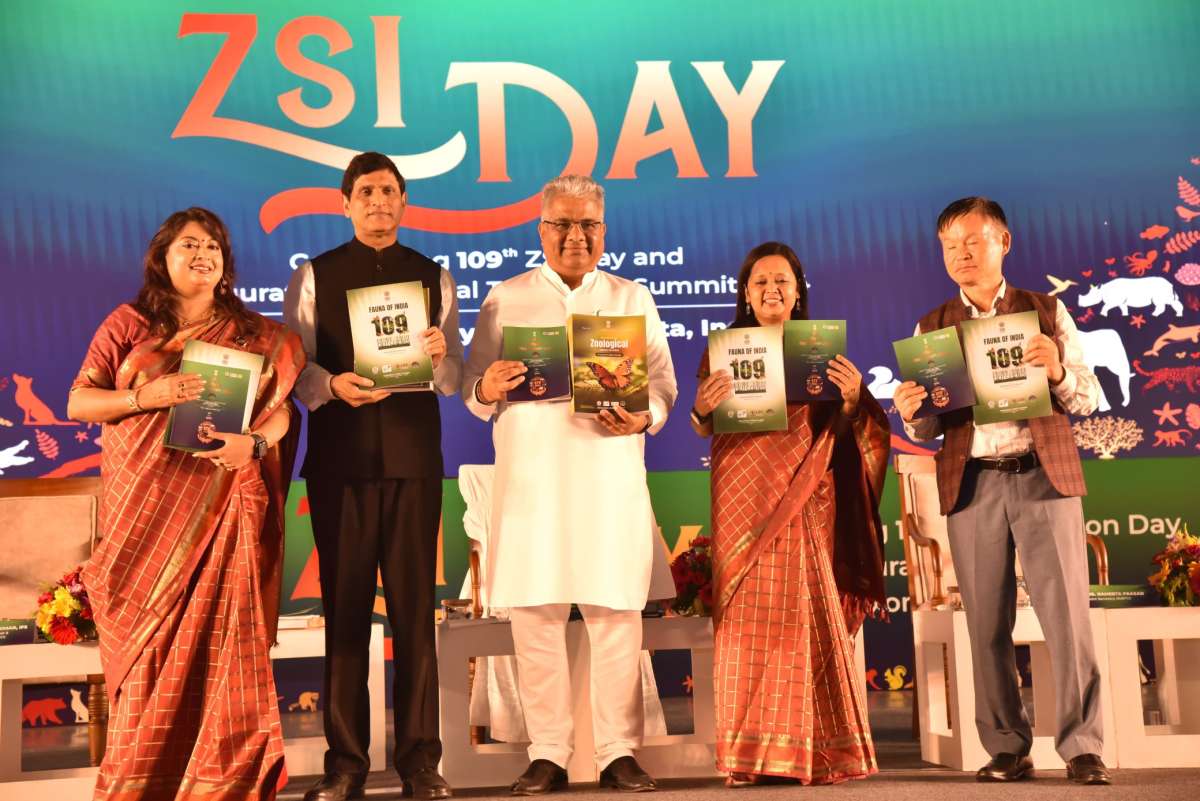India is the first country in the world to prepare a checklist of its entire fauna, covering 104,561 species…reports Asian Lite News
India has become the first country in the world to prepare a checklist of its entire fauna, covering 104,561 species, Union Environment Minister Bhupender Yadav said on Saturday.
He was speaking at the Animal Taxonomy Summit-2024 organised by the Zoological Survey of India (ZSI).
He also launched the Fauna of India Checklist Portal on the occasion of the 109th Foundation Day of the Zoological Survey of India (ZSI) in Kolkata.
The minister said the silver lining is that India is a global champion in biodiversity conservation, adding that our tradition, ethos and values respect nature and promote biodiversity conservation.
“India has become the first country in the world to prepare a checklist of its entire fauna, covering 104,561 species, positioning itself as a global leader in biodiversity documentation,” Yadav said.
The Fauna of India Checklist Portal is the first comprehensive document on the faunal species reported from India, he noted.
“The faunal checklist will be an invaluable reference for taxonomists, researchers, academicians, conservation managers, and policymakers. It comprises 121 checklists of all known taxa covering 36 phyla. Endemic, threatened, and scheduled species have also been included in the list,” he added.
He said, moreover, PM’s Mission LIFE put forth before the world with the theme of sustainable consumption and conservation.
Stressing the concept of a recycling economy, Yadav said: “Whatever we take from nature, efforts should be made to return back the same in pristine, pure form.”
He also highlighted the government’s initiatives like the International Big Cat Alliance to preserve biodiversity and species and said that the relocation of cheetahs to India as a successful project is one such example.
Inaugurating the Animal Taxonomy Summit-2024 organised by ZSI, Yadav congratulated ZSI for completing 109 glorious years dedicated to the service of our faunal biodiversity.
The Animal Taxonomy Summit-2024 is the second summit being organised by ZSI.
During the summit, deliberations will be held under three broad themes, 1) Taxonomy, Systematics and Evolution, 2) Ecology and Animal Behaviour; 3) Biodiversity and Conservation. 350 delegates from four countries, including those from the Natural History Museum, London would participate in the summit.
The three-day summit will witness 21 plenary/ lead lectures of eminent speakers/ experts from India as well as abroad and 142 oral/poster presentations.
The summit will conclude on 3rd July 2024. The recommendations will be conveyed to the Government of India for biodiversity conservation.
The minister, delegates and participants also listened to Prime Minister’s Mann Ki Baat during the programme.
Yadav also released an iconic publication of ZSI, ‘Animal Discoveries- 2023’ comprising 641 new animal species and new records from India and ‘Plant Discoveries- 2023’ of Botanical Survey of India (BSI) comprising 339 new plant species and new records from the country published by scientists, faculties and researchers from India.
Other important publications ‘Fauna of India-109 barcodes’, ‘Catalogue of Hoverflies’, ‘Catalogue of Muscidae’ and ‘Flora of India Series’ were released by the union minister. The first-ever ‘Barcode Atlas of Indian Fishes’- a joint publication by the ICAR-NBFGR, Lucknow & ZSI, Kolkata and ‘ROAR – Celebrating 50 years of Project Tiger’ a book written by Shiladitya Chaudhury & Ketan Sengupta were also released on the occasion.
Director General of Forests and Special Secretary, MoEFCC, Jitendra Kumar launched the ‘International Society of Zoology (ISZ)’ which will enhance the ability of individuals and institutions to contribute to the global understanding and protection of biodiversity.
ZSI exchanged 10 MoUs with universities/colleges (viz. Vidyasagar University, Berhampur University, Madurai Kamraj University, Himalayan University, Ferguson College and Kongunadu Arts & Science College), and with national institutes (ICAR-NBFGR, ICAR-NBAIR, ICAR-CIFA, BITS, Pilani) for better coordination and benefits to masses.
ZSI Director Dhriti Banerjee delivered the welcome address at the event, which was also attended by officials, scientists and researchers from ZSI, BSI vice-chancellors, and of several universities and Indian and overseas institutions. The programme concluded with a cultural performance. (ANI)
Minister cautions against extensive use of natural resources
Union Environment Minister Bhupender Yadav on Sunday emphasized the need to conserve flora and fauna, warning against the reckless exploitation of natural resources for development. Speaking at an event marking the 109th foundation day of the Zoological Survey of India (ZSI), Yadav praised the ZSI’s pioneering work in taxonomy and the scientific evaluation of faunal species, which helps raise public awareness.
He highlighted the ministry’s efforts to conserve the rich biodiversity of sensitive zones like Bhitarkanika in Odisha, Flower Valley in Uttarakhand, Rajasthan’s desert landscape, and the Sundarbans mangrove belt in West Bengal, describing these areas as “Nature’s best gift.”
Yadav stressed the dire consequences of continued resource plundering, warning of a future devoid of animals, birds, and plants. He lamented the general disregard for environmental responsibilities, pointing out the pollution of air and water and the misuse of natural resources.
He noted the extinction of the Cheetah and the government’s success in reintroducing the species to India, thanks to the efforts of forest employees, rangers, villagers, and scientists. Yadav also reaffirmed India’s commitment to tiger conservation on its 50th anniversary.
As a signatory to the Convention on Biological Diversity (CBD), India plays a crucial role, with the ZSI and the Botanical Survey of India (BSI) vital for knowledge sharing. Yadav praised the ‘Fauna of India Checklist Portal,’ launched by the ZSI, containing details of 1,04,561 species—the world’s first such comprehensive list. He lauded the ZSI for reporting 641 new species this year alone.
Identifying climate change as humanity’s biggest threat, Yadav commended the roles of the ZSI and BSI in combating global warming and environmental challenges. The ministry, with these organizations’ involvement, is working on a geospectrum model, mapping biological corridors, and analyzing landscape changes.
ZSI director Dhriti Banerjee revealed that 153 experts prepared the checklist in 2022-23, documenting species from amoebas to elephants across India’s diverse topographies. She also mentioned an upcoming Animal Taxonomy Summit, with 1,700 participants from several countries, scheduled from July 1-3. The ZSI, founded on July 1, 1916, continues to play a pivotal role in biodiversity research and conservation.
ALSO READ: Indian Navy in World’s Biggest Naval Drill














